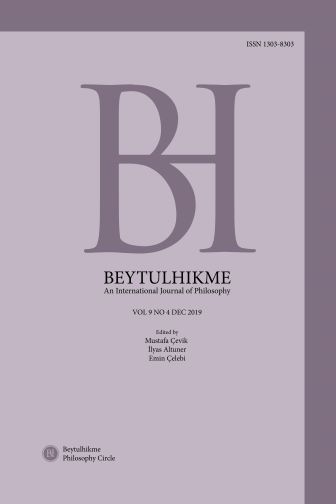Author :
Abstract
Ahlak felsefesinin en önemli tartışma konularından biri, ahlakta duyguların yeridir. Bu makalede ise sevgi nesnesinin, sevenin kendisi olması yani özsevgi problemi erdem olması bakımından tartışılacaktır. Özsevgi, çoğu defa bencillikle aynı anlamda kullanılmakta, bu yüzden ahlaktaki yeri problemli hale gelmektedir. Özsevgiyle ilgili tartışmalarsa tarihsel olarak Aristoteles’e kadar gitmektedir. Aristoteles, iki tür özsevgi arasında ayrım yapar: İlki ahlaki bir kaygı gütmeyen insanların sahip olduğu ve bu çalışmada bencillik denilen özsevgidir. İkincisi ise erdemli bir hayat sürmeyi amaç edinen insanların sahip olduğu, gerçek anlamda özsevgidir. İki tür özsevgi arasında yapılan bu ayrım özsevgi ve bencilik arasındaki farkı ortaya koyduğu gibi özgeci eylemleri özsevginin kapsamına da dahil etmektedir. Bu makalede özsevginin bir erdem olduğu iddia edilmektedir. Bu iddia çerçevesinde Aristoteles’in “orta” kavramının özsevgiye uygulanmasının yani özsevginin bencillik ve özgeciliğin “orta”sı olarak konumlandırılmasının mümkün olup olmadığı da tartışılacaktır.
Keywords
Abstract
One of the most important debates of moral philosophy is the place of emotions in morality. In this article, the object of love will be discussed in terms of the fact that it is the person who loves himself/herself, that is, the problem of self-love being a virtue. Self-love is often used in the same sense as selfishness, so its place in morality becomes problematic. Debates about self-love date back to Aristotle historically. Aristotle distinguishes between two types of self-love: The first is self-love, which is called selfishness in the study, which is owned by people who feel no moral concerns. The second is the true self-love of people who aim to lead a virtuous life. This distinction between two types of self-love reveals the difference between self-love and selfishness and includes altruistic, or selfless, actions within the scope of self-love. In this article, it is claimed that self-love is a virtue. Within the framework of this claim, it will be discussed whether it is possible to apply Aristotle's concept of “mean" to self-love, that is, to position self-love as the “mean" of selfishness and altruism.
Keywords
- Annas, J. (1989). Self-Love in Aristotle. The Southern Journal of Philosophy, 27 (1), 1– 18.
- Annas, J. (1993). The Morality of Happiness. New York: Oxford University Press.
- Aristoteles (1999a). Eudemos’a Etik. (Çev. S. Babür). Ankara: Dost Kitabevi.
- Aristotle (1999). Nicomachean Ethics. (Trans. T. Irwin). Indianapolis: Hackett Publishing Company.
- Aristotle (2003). The Nicomachean Ethics. (Trans. H. Rackham). Massachusetts: Harward University Press.
- Aristoteles (2009). Nikomakhos’a Etik. (Çev. S. Babür). Ankara: BilgeSu Yayıncılık.
- Aristoteles (2014). Nikomakhos’a Etik. (Çev. Z. Özcan). Ankara: Sentez Yayıncılık.
- Aristoteles (2016). Magna Moralia. (Çev. Y. G. Sev). İstanbul: Pinhan Yayıncılık.
- Aristotle (1976). The Ethics of Aristotle: The Nicomachean Ethics. (Trans. J. A. K. Thomson). New York: Penguin Books.
- Branden, N. (2010). Herkes Bencil Değil midir? Bencilliğin Erdemi. (Ed. A. Rand, çev. N. Kandemir). İstanbul: Plato Film Yayınları, 83-90.
- Cevizci, A. (2005). Paradigma Felsefe Sözlüğü, İstanbul: Paradigma Yayıncılık.
- Copleston, F. (1998). Felsefe Tarihi: Hobbes-Locke. (Çev. A. Yardımlı). İstanbul: İdea Yayınevi.
- Erkızan, H. N. (2012). Aristoteles’ten Nussbaum’a İnsan. İstanbul: Sentez Yayıncılık.
- Fârâbi (1987). Fusulü'l Medeni. (Çev. H. Özcan). İzmir: İstiklal Matbaası.
- Fârâbi (1999). Mutluluğun Kazanılması. (Çev. A. Arslan). Ankara: Vadi Yayınları.
- Garrett, A. (2012). Joseph Butler's Moral Philosophy. Stanford Encyclopedia of Philo- sophy. https://plato.stanford.edu/entries/butler-moral.
- Homiak, M. L. (1981). Virtue and Self-Love in Aristotle's Ethics. Canadian Journal of Philosophy, 11 (4), 633-651.
- Irwin, T. H. (1980). The Metaphysical and Psychological Basis of Aristotle’s Et- hics. Essays on Aristotle’a Ethics. (Ed. A. O. Rorty). Berkeley: University of California Press, 35-55.
- İbn Miskeveyh (1983). Tehzîbu'l-Ahlâk. (Çev. A. Şener, İ. Kayaoğlu, C. Tunç). Ankara: Başbakanlık Basımevi.
- İhvân-ı Safâ (1995). Resâilu İhvan’is-Safâ ve Hullâni’l-Vefâ, I-V. (Haz. ve tah. A. Tâmir). Beyrut-Paris.
- Kraut, R. (1991). Aristotle on the Human Good. Princeton, NJ: Princeton University
- Millgram, E. (1987). Aristotle on Making Other Selves. Canadian Journal of Philo- sophy, 17 (2), 361-376.
- Nietzsche, F. (2010). Güç İstenci. (Çev. N. Epçeli). İstanbul: Say Yayınları.
- Özlem, D. (2010). Etik. İstanbul: Say Yayınları.
- Shaftesbury (2001). Characteristicks of Men, Manners, Opinions, Times. (Ed. D. den Uyl). Indianapolis: Liberty Fund.
- Stirner, M. (2013). Biricik ve Mülkiyet. (Çev. S. T. Noyan). İstanbul: Kaos Yayınla- rı.
- Tüfenkci, S. (2017). Din Felsefesi Açısından İnsan Doğası. Ankara: Araştırma Yayın- ları.
- [*] Bu makale, 25-27 Nisan 2019 tarihlerinde Nevşehir’de düzenlenen I. Uluslararası Kapadokya





